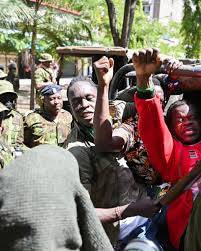**Police in Kenya Fire Teargas at Protest Over Alleged Abductions**
Kenyan police fired teargas to disperse protesters in Nairobi on Thursday as tensions escalated over a series of alleged abductions and disappearances linked to security forces. The demonstration, organized by human rights groups and families of missing persons, sought accountability for what activists describe as a troubling pattern of enforced disappearances in the East African nation.
### The Protest and Police Response
The protest began peacefully outside the Nairobi police headquarters, with demonstrators carrying placards reading, “Bring Them Back†and “Stop the Abductions.†Chanting slogans and singing, they demanded answers about the fate of loved ones who have gone missing under suspicious circumstances.
However, as the crowd grew, police moved in to break up the gathering, citing a lack of prior authorization for the protest. Officers deployed teargas, causing panic and scattering the protesters, many of whom fled into nearby streets. Witnesses reported chaos as mothers holding photos of their missing sons and daughters were forced to run for cover.
“We came here to demand justice, not to be attacked,†said Mary Wanjiru, whose son disappeared last year. “The police are supposed to protect us, not silence us.â€
### A Pattern of Disappearances
Kenya has faced mounting criticism from local and international human rights organizations over allegations of extrajudicial killings and enforced disappearances, particularly in the context of counterterrorism operations. Activists claim that dozens of people, mostly young men from marginalized communities, have gone missing in recent years after being arrested or detained by security forces.
The Independent Medico-Legal Unit (IMLU), a Kenyan human rights organization, reported 112 cases of enforced disappearances between 2020 and 2023. While the government has denied involvement, many families believe security agencies are responsible.
One high-profile case is that of human rights lawyer Willie Kimani, who was abducted and killed in 2016 alongside his client and a taxi driver. The case, which shocked the nation, resulted in the conviction of four police officers. Despite this, activists argue that little has changed in addressing systemic abuses.
### Government Response
The Kenyan government has repeatedly denied allegations of a systematic policy of enforced disappearances. Interior Minister Kithure Kindiki recently stated that the government is committed to upholding human rights and has launched investigations into reported cases.
“We take these allegations seriously,†Kindiki said in a press briefing. “Any officer found guilty of violating the law will face the full force of justice.â€
However, critics argue that these assurances ring hollow in the absence of tangible results. Human rights groups have called for the establishment of an independent commission to investigate disappearances and provide accountability for victims’ families.
### Voices of the Families
For the families of the missing, the pain of uncertainty is compounded by the lack of support from authorities. Many have spent months or even years searching for their loved ones, visiting morgues, prisons, and police stations without success.
Among the protesters was Ali Mohammed, whose brother vanished after being picked up by plainclothes officers in Nairobi’s Eastleigh neighborhood. “Every day, we wake up hoping for news, but there’s nothing,†Mohammed said. “We just want to know if he’s alive or dead.â€
Human rights advocate Haki Africa has been at the forefront of efforts to document cases and assist affected families. “These disappearances are not isolated incidents,†said the organization’s executive director, Hussein Khalid. “They are part of a broader pattern of abuse by security forces targeting specific communities, particularly in the name of fighting terrorism.â€
### International Outcry
The issue of enforced disappearances has drawn the attention of international human rights organizations, including Amnesty International and Human Rights Watch. Both groups have urged Kenya to ratify the International Convention for the Protection of All Persons from Enforced Disappearance, which it has signed but not yet incorporated into domestic law.
“Kenya must prioritize the protection of its citizens and ensure accountability for human rights abuses,†said Amnesty International’s East Africa director, Irungu Houghton. “Silencing protests with teargas only deepens the mistrust between the public and the state.â€
The United Nations Working Group on Enforced or Involuntary Disappearances has also called on Kenya to address the issue, emphasizing the need for comprehensive investigations and reparations for victims’ families.
### A Growing Movement
Despite the police crackdown, Thursday’s protest has galvanized public attention on the issue of enforced disappearances in Kenya. Activists vowed to continue their fight for justice, calling for more demonstrations and international pressure on the government.
“This is not the end,†said Khalid. “We will keep speaking out until every missing person is accounted for and every perpetrator is held responsible.â€
For the families, the hope remains that their voices will lead to action. “We just want the truth,†said Wanjiru. “We deserve to know what happened to our loved ones.â€
### Conclusion
The use of teargas to disperse Thursday’s protest highlights the challenges faced by activists and families seeking accountability for enforced disappearances in Kenya. As the issue gains increasing visibility both locally and internationally, the government faces growing pressure to address allegations of abuse and deliver justice for victims. Until then, the families of the missing continue to live in limbo, united by their determination to uncover the truth.




No comments yet
Be the first to share your thoughts!